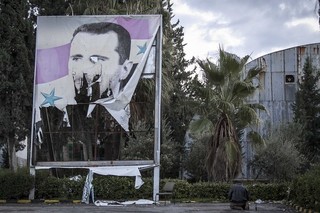As Assad’s army weakens, rebels and analysts warn, it is also becoming more extreme in its fight for survival. And two of the grimmest scenarios observers have long feared—that Islamic extremism could come to dominate the rebel fight, and that Assad could decide to attack with chemical weapons—now look more likely than ever to take hold. Many Sunni soldiers have left the military’s ranks, leaving behind a core of dedicated troops, most of them Alawites like Assad. Though the sect makes up a relatively small proportion of the Syrian population—around 12 percent—it has dominated the country’s political machine for decades, and Assad has painted himself as the protector of the Alawites, along with other minorities such as Christians, Druze, and Ismailis. Now, after months in which Assad’s forces have leveled cities—and during which more than 40,000 people have died, according to activist groups—many loyalist troops feel their backs against the wall. “They know that the people on the ground know who they are,” says Khalil, who finally escaped to Turkey this fall, “and they know that justice will be brought” if the rebels prevail. “Their support for the regime is getting stronger and stronger. They know they have to fight to the end.”
Inside Syria's Crumbling, Radicalizing Army
Mike Giglio, The Daily Beast December 10, 2012
Read Full Article »
Related Topics: Syria, Bashar Assad
Comment
Related Articles
Country Streams
Select
-
 Afghanistan
Afghanistan
-
 Algeria
Algeria
-
 Argentina
Argentina
-
 Armenia
Armenia
-
 Australia
Australia
-
 Austria
Austria
-
 Brazil
Brazil
-
 Burma
Burma
-
 Canada
Canada
-
 China
China
-
 Colombia
Colombia
-
 Cuba
Cuba
-
 Cyprus
Cyprus
-
 Czech Republic
Czech Republic
-
 Egypt
Egypt
-
 Finland
Finland
-
 France
France
-
 Georgia
Georgia
-
 Germany
Germany
-
 Greece
Greece
-
 Haiti
Haiti
-
 Honduras
Honduras
-
 India
India
-
 Indonesia
Indonesia
-
 Iran
Iran
-
 Iraq
Iraq
-
 Ireland
Ireland
-
 Israel
Israel
-
 Italy
Italy
-
 Japan
Japan
-
 Kyrgyzstan
Kyrgyzstan
-
 Lebanon
Lebanon
-
 Libya
Libya
-
 Malaysia
Malaysia
-
 Mexico
Mexico
-
 Netherlands
Netherlands
-
 Nigeria
Nigeria
-
 North Korea
North Korea
-
 Norway
Norway
-
 Pakistan
Pakistan
-
 Palestine
Palestine
-
 Philippines
Philippines
-
 Poland
Poland
-
 Qatar
Qatar
-
 Russia
Russia
-
 Saudi Arabia
Saudi Arabia
-
 Serbia
Serbia
-
 Somalia
Somalia
-
 South Africa
South Africa
-
 South Korea
South Korea
-
 Spain
Spain
-
 Sri Lanka
Sri Lanka
-
 Sudan
Sudan
-
 Sweden
Sweden
-
 Switzerland
Switzerland
-
 Syria
Syria
-
 Taiwan
Taiwan
-
 Thailand
Thailand
-
 Turkey
Turkey
-
 Ukraine
Ukraine
-
 United Arab Emirates
United Arab Emirates
-
 United Kingdom
United Kingdom
-
 USA
USA
-
 Venezuela
Venezuela
-
 Vietnam
Vietnam
-
 Yemen
Yemen
-
 Zimbabwe
Zimbabwe
Recommended
World
- World
- Books
- Defense
- Education
- Energy
- Health
- History
- Investigations
- Markets
- Policy
- Politics
- Public Affairs
- Religion
- Science
Sign up for RC newsletters
- Carl M. Cannon's Morning Note✓
- RCP Daily Poll Wrap-Up✓
- RCP Today ✓
- RealClearInvestigations Today✓
- RCP Events✓
- RCD Morning Recon ✓
- Science News✓
- RealClearEnergy Morning Volt✓
- World News✓
- Education Today✓
- RealClearHealth Morning Scan✓
- RealClearPolicy Today✓
- RealClearReligion Today✓
- RealClearBooks Today✓
- RealClearHistory Today✓
- RealClearMarkets Today✓

I Agree to the Privacy Policy and Terms of Service
Recommended
Science
Popular in the Community






